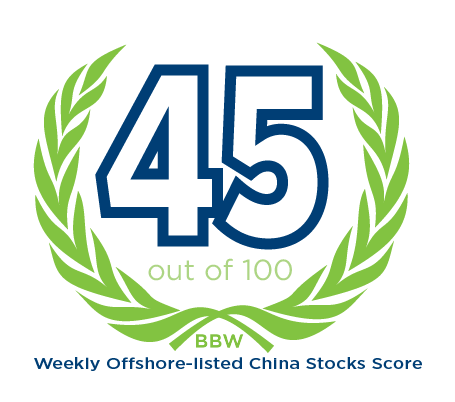CHINA BULLETIN: Economic Growth Target Stays at 5%


In this week’s issue GDP growth target unchanged, Apple sales plunge and a Belle returns to the Hong Kong ball. On a scale of 1 to 100, we give the week a 45 for offshore-listed China stocks.
Doug Young, Editor in Chief
You can sign up to get China Bulletin weekly in your inbox.
MACRO
Economic Growth Target Stays at 5%
Another “Two Sessions” has come and gone, this time without much of the usual pageantry. The highlight of this year’s meetings was the announcement of a 2024 GDP growth target of 5%, which is roughly the same as last year. But this time around, Premier Li Qiang admitted the goal could be tough in China’s current economic environment.
If anyone wanted to ask Li for more thoughts at the usual Two Sessions closing press conference, they were out of luck as it was cancelled, ending a 30-year tradition. Such attempts at western-style transparency seem to be falling out of vogue under China’s current leadership, which, admittedly, has more to worry about than looking open to a western audience.
Unexpected Strength for Exports
While meeting the 5% growth target this year might be a stretch, exports were doing their part to achieve that goal, at least in the first two months of 2024. China’s exports rose 7.1% year-on-year for the two-month period, easily topping a Reuters poll that had forecast a 1.9% rise. Imports also rose 3.5%, again topping expectations for a 1.5% jump.
Exports benefited from strong demand for electronics, including microchips, as well as a low base from the year-earlier period. Still, anything in positive territory is good for this important metric, which contracted for most of the second half of last year. The Chinese gain parallels similar strength for Korea and Taiwan, suggesting global trade is picking up after a period of weakness.
Stocks Stay Low-Key for a Second Week
The low-key mood in Beijing flowed over into offshore-listed Chinese stocks last week, which were largely unchanged for a second consecutive week. The Hang Seng China Enterprises Index ended down 1.3% for the week, similar to a 1.4% decline for the broader Hang Seng Index. On the other side of the Pacific, the iShares MSCI China ETF was down 1.7% for the week.
In a bit of stock market-related news from the Two Sessions, newly installed China Securities Regulatory Commission Chairman Wu Qing suggested he won’t be loosening up oversight of new listings anytime soon. That’s not surprising given the current weakness on China’s stock markets, and could produce a bumper crop of new applications for U.S. and Hong Kong IPOs.

Industry
EV Sales Slow, and Could Slow Even More in Europe
It’s only a little more than two months into the year, and already things are looking a bit rocky for China’s vibrant new energy vehicle (NEV) sector. Electric vehicle sales rose “just” 18.2% in January and February combined, which was down from 20.8% for all of 2023 and is quite a bit lower than the triple-digit gains seen at various points when the industry was driving ahead full throttle.
While the domestic market is slowing, Europe was picking up some of the slack with a huge surge in imports. But that may end soon, with reports that the EU started registering imported Chinese EVs last week and could retroactively impose anti-dumping tariffs on them if an ongoing probe determines those vehicles were produced using unfair state support.
Apple Sales Plunge on Huawei Revival
Over in the smartphone arena, Apple was licking its wounds as its China sales tumbled 24% in the first six weeks of the year, with a resurging Huawei taking some of that share by recording its own 64% gain. These figures probably don’t tell the whole story, since Huawei’s 64% gain is coming off quite a low base and thus doesn’t really make up for all of Apple’s losses.
The bigger story is that Chinese consumers are reining in their spending as the economy slows, and bigger-ticket items like smartphones are feeling more pressure than other cheaper categories like restaurant dining and clothing purchases. China’s broader smartphone market has been contracting for several years now, and that trend looks likely to continue into 2024.
China Extends Visa-Free Visitor Program
International tourism in China has been slow to recover post-pandemic, partly due to lack of flights but also because many foreigners simply aren’t as interested in the Middle Kingdom as they were when its economy was booming. China is hoping to lure some of them back by making trips easier, and is dropping visa requirements for a growing list of countries for short trips.
Last week it added another six countries to that list, namely Switzerland, Ireland, Hungary, Austria, Belgium and Luxembourg. Late last year, China announced similar visa-free travel for citizens of France, Germany, Italy, the Netherlands, Spain and Malaysia. While foreign tourists aren’t flooding back just yet, you do seem to see a few more foreign faces than before on the streets these days.

Company
New Congressional Push for TikTok Sale
Recent momentum for a second presidential term for Donald Trump is emboldening lawmakers to revive one of his earlier signature efforts as president, namely forcing a sale of the popular TikTok video app by its Chinese parent, ByteDance. In the latest move on that front, a bipartisan group of U.S. lawmakers last week introduced legislation that would force such a divestiture.
Getting TikTok to shed its China connection became a major cause for Trump, and talks were underway before being abandoned after Trump lost the 2020 election. Some U.S. senators tried to revive the campaign last year, but their proposal ultimately failed after TikTok mounted a strong lobbying campaign. Still, this does seem to be one rare area where both parties agree.
Alibaba Welcomes WeChat Users to Its DingTalk Meeting App
Alibaba and Tencent are China’s two biggest internet companies, and are also famous for their fierce rivalry. But Alibaba seems to be calling a truce of sorts, at least in one area, with word last week that it was making its DingTalk online meeting app increasingly accessible to users of Tencent’s hugely popular WeChat.
The move looks at least partly aimed at boosting DingTalk as Alibaba prepares to break itself up into its various major business units to operate independently. It could also reflect a nascent era of greater harmony between China’s internet majors, following a brutal crackdown on anti-competitive behavior that saw Alibaba fined $2.8 billion in 2021.
Morgan Stanley Cuts Staff at China Fund Unit
China’s anemic stock markets are hardly attracting too many investors these days, and Morgan Stanley has resigned itself to that by laying off about 9% of the staff at its China fund unit. The actual size of the layoffs wasn’t huge, with about 15 employees affected by the cuts at Morgan Stanley Investment Management China.
Morgan Stanley took full ownership of the company just last year with a buyout of its local partner. The unit is losing money, so these job cuts are at least partly aimed at reducing those losses. Still, demand for the unit’s asset management services is probably quite low at the moment, as it has to compete with far larger domestic rivals for a limited pool of business.
AND FROM THE PAGES OF BAMBOO WORKS
| Belle Fashion: Back in Vogue, or Yesterday’s Shoes in New Wrapping? Last week we bought you the story of Belle Fashion, the shoe giant that was once an investor darling before falling out of step with the times. The company, previously known as Belle International, was listed in Hong Kong, but privatized in 2017 after its business began to stumble. Now, it’s hoping to make a comeback with a new application to relist in Hong Kong. This time the new Belle is a slimmed down version of its former self, having spun off its sports shoe division and closed thousands of department store outlets that used to be its mainstay. During its nearly seven years out of public view, the company boosted e-commerce to around 20% of its sales. It’s also abandoning its department store approach and opening smaller outlets in malls. |
| Shanghai Refire Bets on China’s Hydrogen Energy Ambitions We also brought you the story of Shanghai Refire, a hydrogen energy specialist that is hoping to hit it big on China’s ambitious goal of building up hydrogen as a major clean energy source. The company has also filed for a Hong Kong listing, with a fundraising target that could climb above $100 million. While hydrogen has struggled to catch on in the rest of the world, China seems to feel it’s a promising technology and has lavished the sector with a wide range of government incentives these last few years. While Shanghai Refire is currently a leader in the space, it’s likely to face lots of competition from new entrants if the technology really takes off. |






